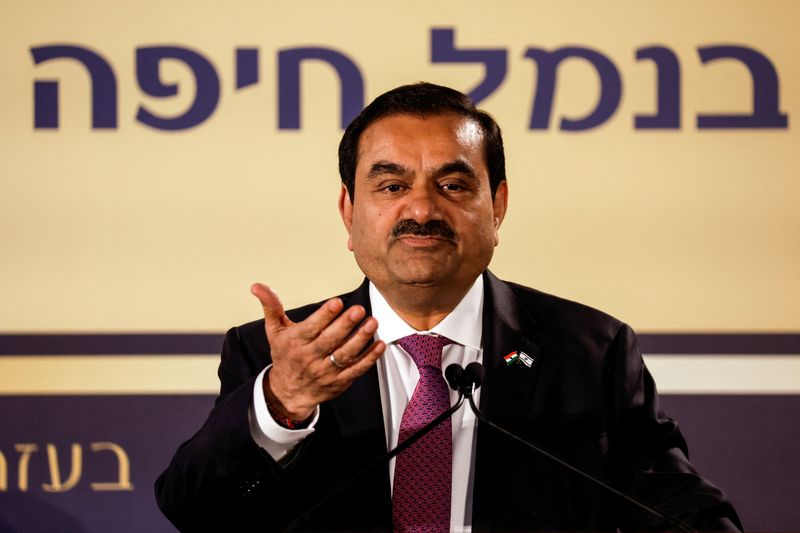Investing.com’s stocks of the week
By Kane Wu and Davide Barbuscia
HONG KONG/NEW YORK (Reuters) - India's Adani Group may have passed a key test by raising $2.5 billion in the face of a short-seller attack, but its response to the allegations and the outcome of regulatory probes will shape its prospects, analysts and investors say.
Most of the conglomerate's shares dropped on Wednesday, extending losses to $84 billion after Hindenburg Research's report last week alleged improper use of offshore tax havens and flagged concerns about high debt.
The port-to-property group, led by Gautam Adani, one of the world's richest people, has denied the allegations and called them baseless, adding it has always made the necessary regulatory disclosures.
Adani's latest fundraising was critical, not just because it will help cut the group's 2.2 trillion rupees ($27 billion) of debt, but also because it was viewed as a test of investor faith amid business and reputational challenges.
The completion of the secondary share offering to raise $2.5 billion, India's largest such deal, alleviates some of the pressure on Adani's credibility, said Ken Shih, Hong Kong-based head of wealth management at Saxo Markets.
"But from an offshore investor's perspective the allegations (made by Hindenburg) ... do not seem to be clearly addressed," he said.
"There may be even more organised short sell attacks ... given they were unable to clearly squash all remaining concerns and allegations yet. Until that happens there is blood in the water now and other short sellers might come circling."
Adani has said Hindenburg's report was a "calculated attack" on India and its institutions. The U.S. short-seller has said Adani's "response largely confirmed our findings and ignored our key questions."
While Adani's share sale was slightly over-subscribed as bids poured in on the last day from foreign institutional and corporate investors, Indian financial firms stayed away and the response was muted from individual buyers.
The identity of the institutions that placed orders on the last day has not been revealed, but the 30% anchor portion of the sale attracted investors including Maybank Securities and Abu Dhabi Investment Authority.
Adani did not immediately respond to a Reuters request for comment for this story.
SERVICING DEBT
Soon after Hindenburg's report was made public, the Securities and Exchange Board of India (SEBI) decided to study it, adding to the regulator's own ongoing preliminary investigation into the group's foreign portfolio investors, Reuters reported on Monday, citing sources.
Australia's corporate regulator said on Wednesday it would review the Hindenburg report as concerns raised also relate to Adani's Australian operations.
State-run Life Insurance Corporation, India's largest insurer, is also reviewing Adani's response to the scathing criticism and will hold talks with the group's management within days to seek clarifications.
A U.S.-based investor in dollar bonds issued by Adani's ports and power units said while it would pay "attention" to the information in the next few weeks, the fund would explore adding to holdings if others sell in the event of ratings downgrade.
"We would get worried if for some reason they couldn't borrow more money or if their cash flow becomes insufficient to cover debt service. And those two things aren't happening," said the investor, who spoke on condition of anonymity.
However, underscoring the nervousness in some quarters, Bloomberg reported on Wednesday that Credit Suisse had stopped accepting bonds of Adani group companies as collateral for margin loans to its private banking clients.
Credit Suisse had no immediate comment.
"The question about what next for the allegations partly depends on whether SEBI or others take up the investigation," said Quiddity Advisors analyst Travis Lundy, who writes on investment research network Smartkarma.
Adani Enterprises lost nearly 6% on Wednesday to bring its losses since the Hindenburg report to more than $8 billion. The current market price of 2,803 rupees is also below the indicative price band for the offering.
"To do another offering, they will need to prove that the last one was a success - either by stock price or by business growth - and they have a grand plan," Lundy said.
